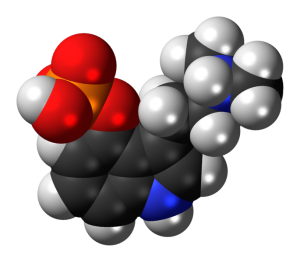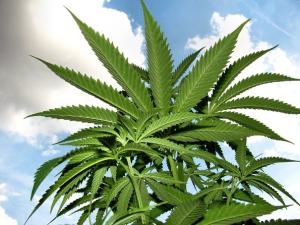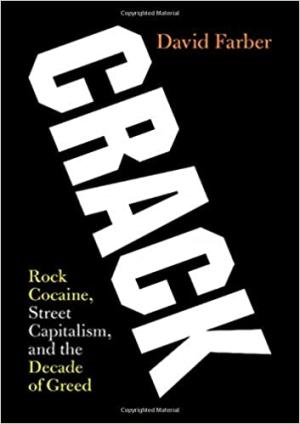David Farber has written a provocative social and cultural history of crack cocaine.
More than a hundred social justice and drug reform groups call on Congress to move the marijuana legalizing MORE Act next month, researchers at Johns Hopkins are partnering with a nonprofit on new research into psilocybin, and more.
After years of delay, Maine regulators say retail marijuana outlets will be open in October, eight people were killed in a Colombian region where different leftist guerrillas are fighting each other for control of the drug trade, and more.
A coalition of state treasurers is urging Congress to pass marijuaan banking reforms as part of any coronavirus relief package, Arizona's Maricopa County improves the way it handles smalltime pot busts, and more.
Vermont legislators look to reconcile House and Senate legal marijuana sales bills, UN officials in Colombia denounce an increasing number of massacres, and more.
A new poll shows bipartisan support for marijuana legalization, Colombian coca eradication goes into high gear amidst the pandemic, and more.
Crack: Rock Cocaine, Street Capitalism, and the Decade of Greed by David Farber (2019, Cambridge University Press, 214 pp., $24.95 HB)
As we live through the year of the pandemic, with its disproportionate impact on poor and minority communities, it is striking how those differential impacts mirror what happened with crack cocaine in the 1980s. Crack was never pandemic nor even truly epidemic -- its users numbered in the hundreds of thousands and only a vanishingly tiny number of Americans ever tried it -- but like the coronavirus, it ravaged predominantly Black communities, as did the heavy-handed official response to it.
University of Kansas historian David Farber takes the reader back to the days of vial-filled streets, especially the mid-1980s, when the emergence of this smokable form of cocaine, available in cheap, single dose units (rocks) made a drug that was formerly the province of the wealthy and well-connected a mass market commodity. A gram of powder cocaine, after all, was going for $100, but you could pick up a rock of crack and get an instant high for $5.
The problem was that the $5 high was gone in a few minutes. A lot of people, Farber notes, used crack recreationally. They'd buy a pocketful of rocks, smoke 'em up, and call it a night. But for some people, the crack high proved so alluring, the urge to hit the pipe so irresistible, that they lost everything to the drug. Their possessions -- pawned for pennies on the dollar to get another rock -- and then their friends' and families' possessions, thieved for more rocks, their cars, their homes -- all gone to feed a habit so compulsive women would give blow jobs in alleys for enough money for another rock and men would steal old ladies' purses in the street.
But who would find something like that alluring? Farber points to ethnologist Philippe Bourgeois, who lived among and wrote about a group of Queens crack dealers and their clientele, for an explanation: "Crack as a preferred drug of abuse only appeals to desperate population subgroups who are victims of extreme forms of structural violence," Bourgeois wrote.
Farber himself elaborates on that theme: "Crack become so popular and then so problematic in poor communities... because most of the people drawn to chronic crack use were already in deep trouble of all kinds before they took their first hit," he writes. "The trouble -- economic, educational, psychological, cultural… the list goes on -- was shaped by the callous and racist society in which they lived. And then once these troubled people started using crack, most every kind of authority, from the police to social workers to local prosecutors, mostly made their lives worse rather than trying to help them."
It didn't help, Farber explains, that the crews getting rich off selling crack were almost entirely Black, whether Dominicans, Jamaicans, or African-Americans. That made it all the easier for mass media and politicians to demonize them, and indeed, fed by a feast of sensational crack stories, by 1988, nearly two-thirds of American cited drugs as the worst problem facing the country. And by drugs, they largely meant crack.
The political response to the ravages of crack -- not just the decimation of its users but also the violence and disorder of the black-market crack trade -- was savage. At the federal level, Farber traces the three separate crime bills in the 1980s and 1990s (including one in which Joe Biden played a significant role) that paved the way for mass incarceration), including the creation of the infamous 100:1 crack vs. powder cocaine sentencing disparity.
But going after Michelle Alexander's thesis in The New Jim Crow that the crackdown on crack was driven almost entirely by racism, Farber draws out the leading role played by Black politicians, particularly Rep. Charles Rangel of New York, who hounded the Republicans in power in the 1980s to lower the hammer. In so doing, Rangel was responding to increasingly loud complaints from his Black constituents, who for obvious reasons didn't want gun battles, thefts, and dissolute behavior on their doorsteps.
But while federal crack prosecutions helped stuff the federal prison system to the rafters, states and localities certainly added to the repression. Farber points to Chicago, where by 1987 the number of drug cases alone more than doubled the total number of felony cases in the county just a dozen years earlier. The creation in 1989 of a special drug court to handle crack cases dramatically accelerated a streets-to-prison pipeline. The special crack court simply rationalized and made more efficient the effort that sent thousands of mainly Black Chicagoans into the state prison system.
Farber also takes a fascinating look at the links between crack, crack culture, and hip-hop, which all emerged at roughly the same time in the same places, and some of whose stars (Snoop Dogg, 50 Cent, Biggie Smalls) grew up in the trade. The garish displays of wealth endemic to both the trade and hip-hop culture, were symbols of status in impoverished communities.
And wasn't that what America was all about? The 1980s, after all, was the era of "greed is good," and if that attitude held on Wall Street, it also held on the streets. Farber doesn't excuse the violence of the trade -- it precipitated a large increase in murders nearly everywhere it emerged -- or the callousness of knowingly selling an addictive, life-wrecking drug to one's neighbors -- nor does he minimize the damage done to the users most in its grip (and their families and their communities), but he expresses some sympathy for the people whose only real access to the American dream was through slingin' rocks.
"For a short while in the 1980s and 1990s" he writes, "crack was the main chance for tens of thousands of unemployed, undercapitalized young men who dreamed of a world where they were rich and respected and admired. The crack sellers and the crack bingers invented a consumer marketplace with the tools they had on hand and within the possibilities they could imagine. Within their economic and cultural realm, in a broader culture of entrepreneurial greed, what they did made sense."
Crack is a fine work of social and cultural history. If you thought you already knew all about crack, think again, then go out and add this to your library.
back to top
More than a hundred social justice and drug reform groups call on Congress to move the marijuana legalizing MORE Act next month, researchers at Johns Hopkins are partnering with a nonprofit on new research into psilocybin, and more.

psilocybin (Creative Commons)
125 Groups Urge Congressional Action on the MORE Act, The Leadership Conference on Civil and Human Rights, Drug Policy Alliance, and 123 other national and state organizations today called on House Leadership to swiftly advance the bipartisan Marijuana Opportunity Reinvestment and Expungement (MORE) Act (H.R. 3884) to the House floor when Congress returns in September. The MORE Act, the most comprehensive marijuana justice legislation to be considered in Congress, is needed now more than ever to alleviate economic hardship caused by COVID-19 and meet the calls for justice reform echoing all across America. "In November 2019, the House Judiciary Committee made history when it advanced the MORE Act, becoming the first congressional body to vote favorably for a marijuana descheduling bill. Since that time, the circumstances of 2020 have made the failed War on Drugs even more untenable and amplified the voices of those demanding transformation in our criminal legal system. In the face of the evolving COVID-19 pandemic and a growing national dialogue on unjust law enforcement practices, marijuana reform as a modest first step at chipping away at the War on Drugs is more relevant and more pressing than ever before. The MORE Act remains the most effective and equitable way forward," the groups said in the letter.
Montana Marijuana Legalization Initiatives Qualify for November Ballot. The secretary of state has certified that the I-190 marijuana legalization initiative and the C-118 constitutional amendment to set the legal age for marijuana at 21 have presented enough valid voter signatures to qualify for the November ballot. The state will now join Arizona, New Jersey, and South Dakota in voting on marijuana legalization this fall.
Psychedelics
New Psychedelic Research Nonprofit Teams with Johns Hopkins University for Real-World Study on Use of Psilocybin Mushrooms. In a new research study that will greatly expand knowledge of the real-world uses and effects of psychedelic mushrooms (Psilocybin), the nonprofit research organization Unlimited Sciences is collaborating with Johns Hopkins University Center for Psychedelic and Consciousness Research to conduct a survey of people from across the globe, in hopes of becoming the largest registry of its kind. The study by renowned Hopkins researchers, funded by the Denver-based nonprofit Unlimited Sciences, will ask current users of Psilocybin mushrooms validated questions before, during, and after their use of the substance, which has shown promise in previous clinical studies in helping people suffering from depression and other behavioral health conditions. Researchers have long struggled to understand how the drug's effects change outside of laboratory settings, for example in nature, concerts and other popular settings and what implications those effects have on the most common uses.
back to top
After years of delay, Maine regulators say retail marijuana outlets will be open in October, eight people were killed in a Colombian region where different leftist guerrillas are fighting each other for control of the drug trade, and more.

Breonna Taylor (family photo)
Maine Marijuana Retail Shops to (Finally) Open in October. It's been nearly four years since Mainers voted to legalize marijuana, and finally, the state is ready for the outlets to open. The state Office of Marijuana Policy will issue its first recreational marijuana business licenses on September 8, giving stores a month to harvest, test, and package their products before the October 9 opening date. "Today's announcement is a major milestone in honoring the will of Maine voters and a significant step toward launching a new industry in the state," OMP Director Erik Gundersen said in a statement.
Law Enforcement
Kentucky Bill Named for Breonna Taylor Would Ban No-Knock Raids. State Rep. Attica Scott (D) announced Sunday that she was filing a bill named "Breonna's Law" that would ban no-knock search warrants statewide. Under the bill, police would have to knock and announce their presence, police would be subject to alcohol and drug testing after killing someone, and police body cameras to be turned on for at least five minutes before and after serving a warrant. Breonna Taylor was an Emergency Medical Technician shot and killed by Louisville Metro Police officers serving a no-knock warrant for a drug raid. No drugs were found, but her boyfriend opened fire on the late-night home invaders, injuring one officer, and officer fired back wildly, killing Taylor. Her cause has been taken up by the Black Lives Matter movement, and her death has sparked months of protests in Louisville.
International
Eight Gunned Down in Colombia Coca-Growing Region. Unknown gunmen shot and killed eight people in one of Colombia's primary coca-growing regions, officials said Sunday. The killings took place in the town of Samaniego in Narino department, where 20 people have been gunned down in the last two month. Narino borders Ecuador, making it a strategic location on a favored route for smuggling drugs north to Central America and the US. Leftist FARC rebel dissidents are fighting for control of the region with another leftist guerrilla group, the National Liberation Army.
back to top
A coalition of state treasurers is urging Congress to pass marijuana banking reforms as part of any coronavirus relief package, Arizona's Maricopa County improves the way it handles smalltime pot busts, and more.

Can the marijuana industry catch a break with the coronavirus relief bill? (Creative Commons)
State Treasurers Group Lobbies for Marijuana Banking in Coronavirus Bill. A coalition of state treasurers from around the country are calling on Congress to include marijuana banking reforms in the next coronavirus relief package. The move would boost the economy by giving it a much-needed infusion of capital, while protecting workers in the sector, the treasurers argued. The House included the SAFE Banking Act in the relief bill it passed in May, but Senate Majority Leader Mitch McConnell (R-KY), who has long opposed marijuana reforms, sharply criticized House Democrats for including marijuana in the bill. Negotiations on the relief bill are currently going nowhere.
Arizona's Most Populous County Will Defer Pot Possession Prosecutions if Offenders Get a Medical Marijuana Card. Maricopa County (Phoenix) Attorney Allister Adel has announced that anyone who gets arrested in Maricopa County on a simple marijuana possession charge can apply for a medical marijuana card to avoid prosecution. "In cases where the defendant was not in compliance with the AMMA [Arizona Medical Marijuana Act] at the time of the crime solely because the person did not have a valid medical marijuana card, MCAO will dismiss a charge involving any crime covered by the AMMA if the defendant obtains a medical marijuana card and provides proof by the [initial pretrial conference]," the new policy says. That's a vast improvement over past practice under former County Attorney Bill Montgomery. Under the reign of Montgomery and his predecessors, low-level, first- and second-time marijuana offenders were sent to a drug treatment program called TASC, where they would shell out thousands of dollars and submit to frequent urine tests. The county attorney's office would get a cut of the profits.
Drug Policy
Minneapolis Suburb Repeals "Crime-Free, Drug-Free" Ordinance. The city council in the Minneapolis suburb of St. Louis Park voted unanimously Monday to repeal a controversial housing ordinance that police used to order landlords to evict tenants over suspected criminal activity. Tenants who were never convicted or even charged with a crime lost their housing, and once a local news station went public with its investigation, the city council moved quickly to repeal the policy.
International
Committee to Protect Journalists Calls for Investigation After Colombian Soldiers Shoot at Journalist, Threaten Reporters Covering Coca Protests. The Committee to Protect Journalists called Monday for Colombian authorities to undertake a thorough and transparent investigation into an incident where soldiers fired weapons at journalists Fernando Osorio and Edilson Ãlvarez as they covered a coca grower protest, then detained them for six hours and accused them of being left-wing guerrillas. "Colombian authorities should thoroughly investigate soldiers' brazen attacks on journalists Fernando Osorio and Edilson Ãlvarez and ensure that all those responsible are held to account," said CPJ Central and South Americas Program Coordinator Natalie Southwick, in New York. "The fact that this is the second shooting attack by soldiers on Osorio highlights the disregard that some in the Army appear to have for journalists. Impunity in these attacks will only perpetuate violence against journalists."
back to top
Vermont legislators look to reconcile House and Senate legal marijuana sales bills, UN officials in Colombia denounce an increasing number of massacres, and more.

methamphetamine (dea.gov)
Vermont Lawmakers Meet to Advance Legal Marijuana Market. A group of lawmakers are meeting today to try get a bill approved that would allow for legal marijuana sales in the state. The House approved a bill with a 20% sales tax in February; the Senate approved a bill with a 16% sales tax last year. Now, a conference committee of lawmakers will try to iron out the differences. Some nonprofits and small businesses are opposing the current Senate bill, S.54, because they say it fails to provide opportunities for Black people to participate and it fails to include local families and small businesses.
Methamphetamine
US Border Officials See Methamphetamine Resurgence. Meth seizures on the border are rising, US officials say, pointing to the seizure earlier this month of nearly 800 pounds of meth valued at $16 million on the Pharr International Bridge near McAllen, Texas. Days later, another 650 pounds of meth was discovered in a semi-truck crossing the border at San Diego. According to Customs and Border Patrol statistics, its officers have seized 59 tons of meth in the fiscal year beginning last October. That's one and a half times the amount seized in the previous fiscal year, and we still have two months to go.
International
UN Peace Mission Condemns Spike in Colombia Massacres. The UN's peace mission in Colombia, set up to monitor adherence to the 2016 peace deal with the FARC, is condemning what it calls spiraling violence around the country. The mission says it has documented 33 massacres so far this year. It also said it was investigating the killings of 97 human rights defenders since then and that at least 41 former FARC combatants had been killed. In the past week alone, at least 13 people were killed, including eight gunned down at a birthday party in Narino department and five Afro-Colombian teenagers whose bodies were found in a field outside Cali. The UN defines a massacre as the killing of three or more people in the same event by the same group.
back to top
A new poll shows bipartisan support for marijuana legalization, Colombian coca eradication goes into high gear amidst the pandemic, and more.

canada-flag.jpg
New Poll Has Bipartisan Support for Marijuana Legalization. A new poll from Data for Progress has support for marijuana legalization at 58%, including 69% of Democrats and 54% of Republicans. Support among Democrats jumped to 79% when respondents were provided details of the Marijuana Opportunity Reinvestment and Expungement (MORE) Act, which is currently pending before Congress. So did Republican support, which jumped to 60%.
Law Enforcement Professionals Call on Congress to Legalize Marijuana. More than 50 current and former law enforcement professionals have sent a letter to Congress urging it to move swiftly on the Marijuana Opportunity Reinvestment and Expungement (MORE) Act. The letter was signed by the National Black Police Association, Fair and Just Prosecution and Law Enforcement Action Partnership, in addition to dozens of current and former prosecutors, judges and police officers. Cook County State Attorney Kim Foxx and Minnesota Attorney General Keith Ellison (D) were among the list of signees.
Federal Appeals Court Rejects DEA Challenge to Marijuana Rescheduling Lawsuit. The 9th US Circuit Court of Appeals has denied a DEA request to throw out a lawsuit challenging marijuana's listing as a Schedule I drug. The lawsuit was filed in May by a group of scientists and veterans who argue that marijuana's classification is unconstitutional.
International
Canadian Federal Prosecutors Directed to Avoid Drug Possession Charges in Most Cases. The Public Prosecution Service of Canada has issued a directive to prosecutors to not prosecute drug possession cases unless major public safety concerns are involved. Charges should be filed only "in the most serious cases," said agency director Kathleen Roussel. In most cases, prosecutors should seek alternative approaches, such as restorative justice and indigenous approaches. "When deciding whether to initiate and conduct any prosecution, PPSC prosecutors must consider not only whether there is a reasonable prospect of conviction based on the evidence available but also whether a prosecution serves the public interest," she said.
Colombia Coca Eradication Goes into High Gear During Pandemic. Manual coca eradication is occurring at levels not seen for a decade even as the country battles the coronavirus pandemic. In June alone, more than 32,000 acres were forcibly eradicated, more than any month since the government and the FARC signed a peace treaty in 2016. "The government has taken advantage of the pandemic to do an eradication campaign and not to support farmers," said Eduardo Diaz, director of the Agency for the Voluntary Substitution of Illegal Crops under former Colombian President Juan Manuel Santos. "If the government wanted to support farmers, they would also take the opportunity to be present in the territories and support them in the production of food, support them in productive development. It takes the same effort to bring troops to do forced eradication as to bring technicians to do training and plant the fields... They have to pursue drug traffickers, but the farmers aren't drug traffickers."
back to top




